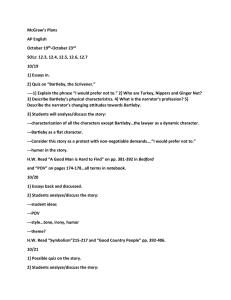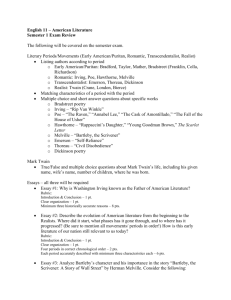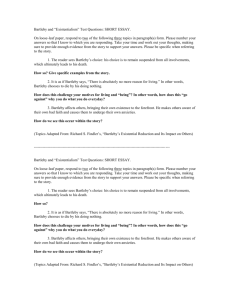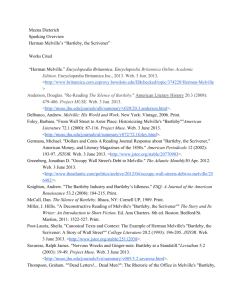Essay #3
advertisement
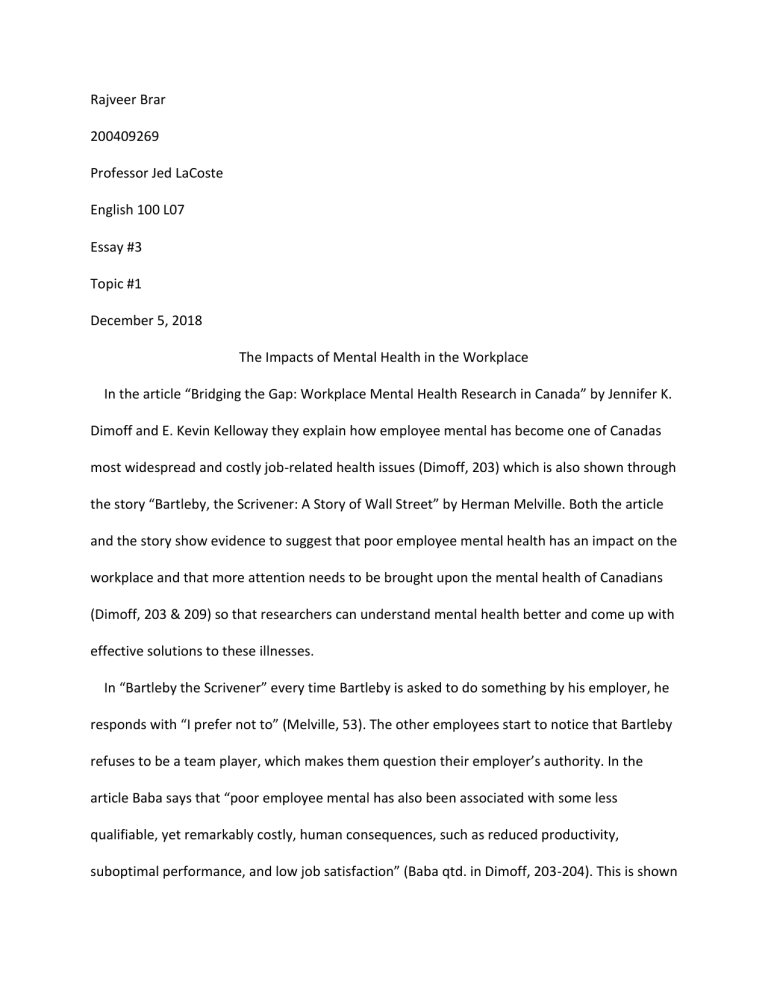
Rajveer Brar 200409269 Professor Jed LaCoste English 100 L07 Essay #3 Topic #1 December 5, 2018 The Impacts of Mental Health in the Workplace In the article “Bridging the Gap: Workplace Mental Health Research in Canada” by Jennifer K. Dimoff and E. Kevin Kelloway they explain how employee mental has become one of Canadas most widespread and costly job-related health issues (Dimoff, 203) which is also shown through the story “Bartleby, the Scrivener: A Story of Wall Street” by Herman Melville. Both the article and the story show evidence to suggest that poor employee mental health has an impact on the workplace and that more attention needs to be brought upon the mental health of Canadians (Dimoff, 203 & 209) so that researchers can understand mental health better and come up with effective solutions to these illnesses. In “Bartleby the Scrivener” every time Bartleby is asked to do something by his employer, he responds with “I prefer not to” (Melville, 53). The other employees start to notice that Bartleby refuses to be a team player, which makes them question their employer’s authority. In the article Baba says that “poor employee mental has also been associated with some less qualifiable, yet remarkably costly, human consequences, such as reduced productivity, suboptimal performance, and low job satisfaction” (Baba qtd. in Dimoff, 203-204). This is shown Brar 2 through “Bartleby the Scrivener” because as the story goes on Bartleby starts to do less and less work until he complete stop doing work and just stares out the office window looking at a wall all day long. So, because of mental health issues employees are unable to work to their full potential and as a result, they produce low quality work. The impacts of mental health in the workplace could be reduced if more attention was brought upon the issue. According to the Mental Health Commission of Canada (MHCC), more attention needs to be drawn towards the mental health of Canadians (MHCC qtd. in Dimoff, 209). MHCC also says that along with Canadians promoting positive mental health in everyday settings, they also need to beg organizations to create the best possible mentally healthy workplace for employees. In “Bartleby the Scrivener” non-of the characters in the story seem to notice that Bartleby might be suffering from a mental illness. The characters in the story seem to miss the signs that Bartleby shows, that would suggest that he has a mental illness. Some of the signs he shows are not eating, not communicating with any of his coworkers, and refusing to follow simple instructions. For example, when his employer says, “the time has come; you must quit this place; I am sorry for you; here is money; but you must go” (Melville, 62). Bartleby is clearly told to quit his job and leave but he does not do so. Eventually, Bartleby’s employer concludes that Bartleby is not going anywhere so he decides to move his offices to a completely new building. Due to the lack of attention towards metal health employers are often unable to see that their employee needs help and that they are not choosing to underperform, it is a mental illness that they cannot control. Another thing that needs to be done to improve mental health in the workplace is more research on the issue. Hugentobler says that “through action research, which requires multiple Brar 3 sources of information and encourages the integration of theory and practice, researchers will be better able to develop, implement, and evaluate workplace mental health strategies (Hugentobler qtd. in Dimoff, 208). In “Bartleby the Scrivener” if Bartleby’s employer had had more knowledge about mental health issues, he would have been able to handle the situation with Bartleby in a better manner. Since he lacked this knowledge, he couldn’t handle Bartleby the way he should have been handled. His employer says that Bartleby is the case of his troubles because he refuses to move from the building which where Bartleby’s employer had his offices (Melville, 68). He tried to get Bartleby to go home with him and not sit around the old offices. When Bartleby refused, he was sent to prison where he died from starvation which was part of his mental illness. Both the article and story suggest that with more research and knowledge of the workplace and be made safe for employees who suffer from mental illnesses. Overall both the article and story try to send the same message across to the reader which is that mental health in the workplace doesn’t just affect the person who has the mental illness it affects everyone around him or her as well. For example, in “Bartleby the Scrivener” when Bartleby refuses to go over his work with the employer the other two employees must do it and this upsets them because they are doing someone else’s work. Also, employers need to educate themselves on mental health issues, so the can be of better help to their employees and understand what is going on instead of misunderstanding what is happening. The article and the story show evidence to suggest that poor employee mental health has an impact on the workplace and that more attention needs to be brought upon the mental health of Canadians (Dimoff, 203 & 209) so that researchers can understand mental health better and come up with effective solutions to these illnesses. Both the article “Bridging the Gap: Brar 4 Workplace Mental Health Research in Canada” by Jennifer K. Dimoff and E. Kevin Kelloway and story “Bartleby, the Scrivener: A Story of Wall Street” by Herman Melville show that mental health needs to be taken more seriously and that employers need a better understanding of what mental health is so that he can help their employees and notice when they are suffering from a mental illness. Brar 5 Work Sited Dimoff, K. Jennifer and Kelloway, E. Kevin “Bridging the Gap: Workplace Mental Health Research in Canada.” Canadian Psychology/Psychologie canadienne, 2013, Vol.54(4), pp.203-212 Herman, Melville. “Bartleby the Scrivener: A Story of wall street.” Elements of Literature. 5th Canadian ed. Robert Scholes, Nancy Comley, Carl Claus, and David Staines. Don Mills: Oxford UP, 2015. 47-72. Print.

